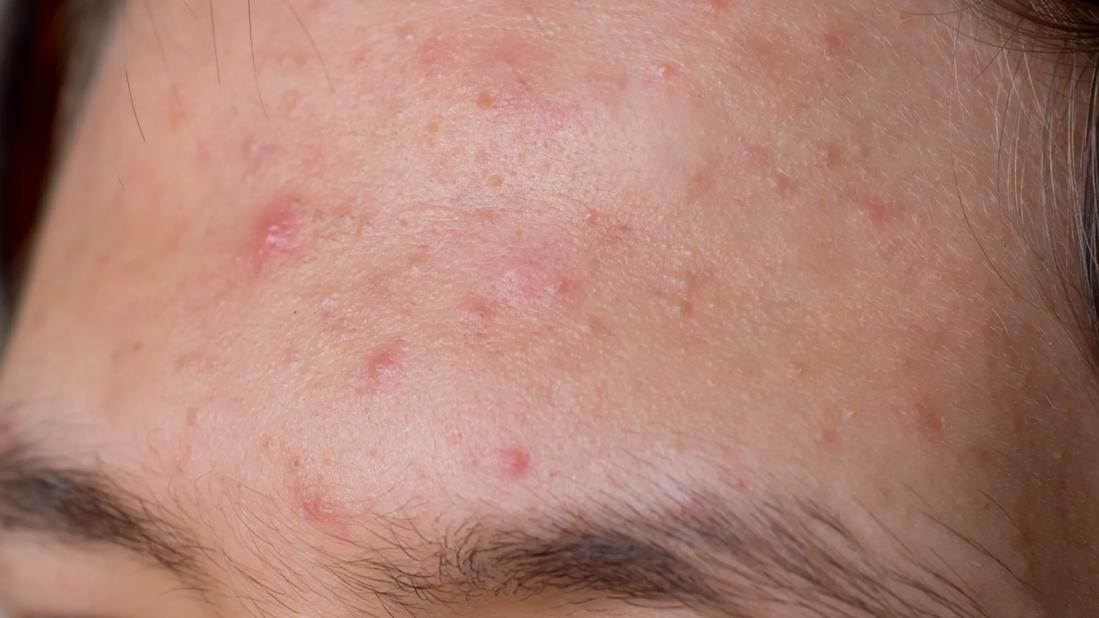Wear light, breathable clothing, shower after you exercise and change your sheets regularly

Image content: This image is available to view online.
View image online (https://assets.clevelandclinic.org/transform/4ef22885-9e9c-46f3-af76-bc7bebba2a4d/pimples-forehead-141571823)
Many pimples on a forehead
If you find yourself breaking out in a sweat and covered in pimples, you’re not alone. Sweat pimples become more common with summer heat and physical activity, but they can pop up after strenuous exercise, too.
Advertisement
Cleveland Clinic is a non-profit academic medical center. Advertising on our site helps support our mission. We do not endorse non-Cleveland Clinic products or services. Policy
Dermatologist Sean McGregor, DO, shares why you get sweat pimples and what you can do to avoid them.
Sweat pimples get worse over the summer because of increased oil production, bacteria, heat and friction that work together to clog your pores and cause inflammation. It’s not the sweat specifically that causes tiny red bumps to form, but it’s the combination of environmental factors (like humidity and heat), with skin irritation and inflammation.
“In the summer months, increased sweating can lead to clogged or obstructed pores,” explains Dr. McGregor. “But we also know that certain lotions and moisturizers, especially those that are a little bit thicker, can contribute to more clogging and further the development of acne — especially when you put sunscreen on top of all that.”
But he’s also quick to say that doesn’t mean you should stop wearing sunscreen. Wear it every day, even when you’re indoors, and cut back on all the other products you use when it’s especially hot outside.
Sweat pimples can pop up any time of the year. It just depends on the amount of bacteria that gets on your skin and how irritated or clogged your pores become. For example, friction is a common cause of sweat pimples year-round. So, if you exercise often or wear tighter clothing, you can sometimes find sweat pimples popping up along your waistline, groin, chest and back, even in the spring or fall.
Advertisement
Heat rash and sweat pimples look similar, but they’re different conditions. A heat rash causes tiny, red bumps to appear in areas that don’t get a lot of oxygen (like your armpits, groin, chest and back).
Unlike sweat pimples, heat rash feels like a prickly, burning itch. It happens when your sweat ducts become blocked, trapping sweat under your skin. If you sweat a lot, a heat rash is a likely occurrence.
If breakouts are bumming you out, there are some helpful solutions. Dr. McGregor suggests the following for reducing the severity of sweat pimples:
“Dermatologists are experts when it comes to skin, hair and nails,” says Dr. McGregor. “If you’re experiencing sweat pimples and have trouble managing your condition with your current regimen, visit a dermatologist.”
Advertisement

Sign up for our Health Essentials emails for expert guidance on nutrition, fitness, sleep, skin care and more.
Learn more about our editorial process.
Advertisement
It’s best to avoid picking at zits, which can damage your skin (though there are ways to minimize the risk)
This medication only works well for short periods of time and when paired with other treatments
‘Zit stickers’ can help heal a new or popped pimple, but they’re limited when it comes to managing acne
Try exfoliating and using salicylic acid to treat this pesky skin care issue
As you age, hormones can continue to play a big role in breakouts
Some remedies might help banish breakouts, but others are best avoided
Birth control pills with estrogen are best for fighting hormonal acne
Hormone fluctuations impact oil and sebum production, creating painful, tender pimples
Prioritize your health by managing stress, strengthening your social connections and getting quality sleep
Bolsters, blankets, pillows and blocks can offer extra support, stability and comfort
Allergies, postnasal drip, asthma or reflux could be to blame for a cough that won’t quit